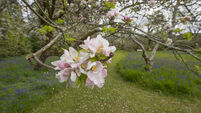Parents for the Planet: Let’s all stop moaning and do something positive

Wed, 18 Mar, 2020 - 22:00
Rita de Brún
Diarmuid McAree In Conversation with Rita de Brún
Formerly chief forest inspector of the Irish Forest Service, Diarmuid McAree holds degrees in forestry, microbiology, entomology and pathology.
Already a subscriber? Sign in
You have reached your article limit.
Subscribe to access all of the Irish Examiner.
Annual €130 €80
Best value
Monthly €12€6 / month
Introductory offers for new customers. Annual billed once for first year. Renews at €130. Monthly initial discount (first 3 months) billed monthly, then €12 a month. Ts&Cs apply.
CONNECT WITH US TODAY
Be the first to know the latest news and updates
CourtsOutdoorsNaturePlace: DublinPlace: RanelaghPlace: KilimanjaroPlace: Republic of IrelandPlace: IrelandPlace: Dublin’s ShankillPlace: GenevaPerson: Diarmuid McAreePerson: Rita de BrúnPerson: InspectorPerson: Tom CreanPerson: TrumpOrganisation: Irish Forest ServiceOrganisation: United NationsOrganisation: Crann — Trees for IrelandOrganisation: Forest Therapy InstituteOrganisation: FCAOrganisation: UCDOrganisation: UNOrganisation: Amazon













